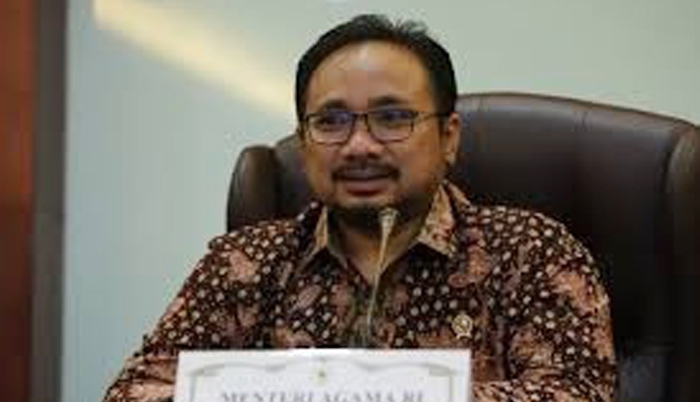![]() Home > Indonesia
Home > Indonesia
‘Poor Communication’ Hampers Religious Affairs Minister's Inclusivity Efforts

Religious Affairs Minister Yaqut Cholil Qoumas (Courtesy of Kompas.id/.)
![]() March 11th, 2022 | 12:50 PM |
March 11th, 2022 | 12:50 PM | ![]() 488 views
488 views
JAKARTA
Since taking office, Religious Affairs Minister Yaqut Cholil Qoumas has pledged to foster religious inclusivity in the Muslim majority nation, but analysts say that poor political communication has hindered some of his progressive policies.
Yaqut’s progressive policies have been met with various pushbacks from different groups, not least because of his choice of words.
Most recently, he was met with criticism after issuing a ministerial circular stipulating guidelines for the use of loudspeakers at mosques.
In one of his statements regarding the circular, the minister compared calls to prayer to the barking of dogs – an animal considered by some Muslims as ritually unclean.
“If I’m a Muslim living in a non-Muslim neighborhood, [you can] imagine what it’s like when houses of worships [around you] use loudspeakers five times a day simultaneously. If your neighbors all have pet dogs and all of them bark at the same time, wouldn’t you be disturbed?” Yaqut said as quoted by Antara late last month in response to criticism of the circular.
Some groups have filed reports to the police accusing the minister of blasphemy.
Most mainstream Islamic organizations such as the Indonesian Mosque Council (DMI), Indonesian Ulema Council (MUI), as well as the country’s largest Muslim organizations Nahdlatul Ulama (NU) and Muhammadiyah, have expressed their support of the circular.
However, other groups have also criticized the regulation. Politicians such as those from the Prosperous Justice Party (PKS) and the National Awakening Party (PKB) – Yaqut’s own party – argued that the use of loudspeakers was technical a matter that should be left to each mosque according to the local traditions.
The conservative 212 Alumni Brotherhood (PA 212) staged a protest at the Religious Affairs Ministry office in Menteng, Central Jakarta, last week.
Ahmad Nurcholis, deputy director of the Indonesian Conference on Religion and Peace, said regulations on mosque speakers were not new; the ministry had issued similar guidance back in 1978. Similar regulations were also present in other Muslim majority countries, he said.
“However, there are beliefs that delivering adzan [call to prayer] and Quran recitals using speakers [from mosques] is part of religious propagation,” Nurcholis said on Tuesday.
Nevertheless, he said the controversy was due in part to figures politicizing the issue to shore up their base and garner sympathy for political gains.
Pluralist stance
Yaqut took office in December 2020, taking over the post previously held by retired Army general Fachrul Razi. He was a member of the House of Representatives from the PKB between 2014 and 2019, and was previously deputy regent of Rembang, Central Java, between 2005 and 2010.
Since 2011, Yaqut has led GP Ansor, the youth wing of NU. Yaqut’s father, Muhammad Cholil Bisri, was one of the founders of the PKB while his elder brother Yahya Cholil Staquf currently leads the chairmanship of NU.
Last year, Yaqut was criticized for offering Nowruz or Persian new year greetings to the Baha'i community in Indonesia in a recorded video. Muhammadiyah and the MUI pointed out that Baha’i was not a recognized religion by the Indonesian government.
Political analyst Adi Prayitno of Syarif Hidayatullah State Islamic University said that as a minister, Yaqut was trying to position himself as a pluralist, but his communication style was lacking.
“His standing position is that all religions and beliefs should be protected, as long as their adherents remain true to the Indonesian state. However, his methods of direct communication – sometimes without the careful choice of words – can lead to misinterpretations [of his message],” Adi said.
Within NU, discussions on minority religious groups, plurality and tolerance are commonplace – unlike among other religious groups and Indonesian Muslims, which may explain Yaqut’s religious inclusivity drive, Adi explained.
“NU’s religious positioning as relatively pluralistic also means [its members are] very flexible within today's society and a preferred choice for the religious affairs minister post,” Adi said.
Political Islam analyst Ahmad Khoirul Umam, however, reminded Yaqut that as a top government official, he must be able to consider different Muslim interest groups and perspectives.
“A government minister is not a kiai [cleric] that has autonomy in his views and logic, as well as the interpretation and implementation of his views. A minister doesn't have that kind of privilege,” Khoirul said.
Ahmad called on the minister to improve his political communication skills so he could put forward his plans and policies more effectively
“Otherwise, his statements as a religious affairs minister would only trigger unnecessary controversies,” Khoirul said.
Source:
courtesy of THE JAKARTA POST
by A. Muh. Ibnu Aqil (The Jakarta Post)
If you have any stories or news that you would like to share with the global online community, please feel free to share it with us by contacting us directly at [email protected]